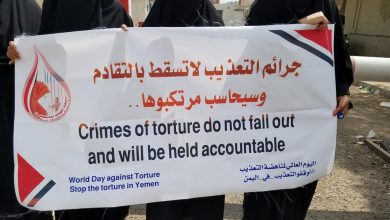“Internationalizing the Response to Attacks”.. US Defense Official Reveals Details of Biden Administration’s Approach to Houthis

Yemen Monitor/Washington/Special:
A senior US defense official said that his government’s approach is based on internationalizing the response to Houthi attacks and integrating military, diplomatic, and economic measures to impose costs on the Houthi leadership.
This came in the testimony of Daniel Shapiro, Deputy Assistant Secretary of Defense for Middle East Affairs, before the US Senate late Tuesday evening, which was reviewed by “Yemen Monitor.”
Shapiro said: “It is clear that these Houthi attacks represent an international problem that affects all countries committed to practicing freedom of navigation and the free flow of trade. These attacks, which affect the entire region and countries around the world, cannot go unanswered and, requires a broad collective response.”
Therefore, our guiding principles are to internationalize the response to Houthi attacks in coordination with our allies and partners, and to integrate military, diplomatic, and economic measures within the entire administration’s approach to impose costs on the Houthi leadership and deter Houthi attacks on commercial shipping.
Shapiro noted that the United States has so far, under this approach, “coordinated several multilateral statements condemning Houthi attacks, imposing new sanctions on the group and designate it as a Specially Designated Global Terrorist (SDGT), and drafting a successful UN Security Council resolution reaffirming the right of states to defend their ships from Houthi attacks.”
“In addition to establishing a coalition of more than 20 countries to patrol the Red Sea and protect commercial shipping, and now carrying out three rounds of joint strikes against Houthi targets in Yemen,” Shapiro said.
230 Targets Inside Yemen
The senior U.S. defense official referred to “Operation Prosperity Guardian,” which he said includes many countries to secure navigation in the Red Sea. In addition, the Pentagon has “engaged in efforts to destroy and weaken the capabilities that the Houthis use to launch maritime attacks, such as anti-ship ballistic missiles, cruise missiles, drones, and facilities known to house such weapons.”
He said that on January 11, January 22, February 3, and February 24, at the President’s direction, we conducted deliberate and carefully planned multinational strikes against Houthi targets in Yemen alongside the United Kingdom and with support of partners that include Australia, Bahrain, Canada, Denmark, the Netherlands, and New Zealand.
In addition, Shapiro said, U.S. forces have also struck Houthi targets, including missiles and drones on launch pads, while nearly thirty times in self-defense in the recent last weeks.
He continued:
“In total, we have struck more than 230 targets in Houthi-run areas through deliberate strikes and self-defense strikes, likely destroying hundreds of Houthi weapons. This does not include the dozens of Houthi missiles and drones that U.S. and it’s partner naval vessels have intercepted and shot down over the Red Sea.
*He noted that “*However, the Houthis appear committed to continue their maritime attacks with the remaining stockpiles of weapons they have.”
Disrupting Arms Shipments to the Houthis
Shapiro also noted that his administration’s approach is based on stopping the flow of lethal aid of Iranian origin to the Houthis: On January 11 and 28, U.S. forces intercepted dhows carrying Iranian-origin lethal aid to the Houthis in Yemen, in clear violation of international law.
In these recent interdictions, U.S. forces discovered over 200 packages containing components for unmanned underwater/surface vehicles; self-propulsion and guidance, warheads for Houthi medium-range ballistic missiles (MRBMs) , anti-ship cruise missiles (ASCMs), components associated with air defense, military communications and networking equipment, anti-tank guided missile launcher kits, explosives, and other military components.
Shapiro continued: The Houthis have used these weapons to threaten and attack not only U.S. Navy ships, but also innocent mariners on board of international commercial vessels transiting the Red Sea, Bab al-Mandab, and Gulf of Aden.
Iran does not control the Houthis in the same way it controls Iranian-aligned militias in Iraq and Syria, but it certainly has the choice to provide or withhold support to the Houthis, without which the Houthis would struggle to effectively track and strike ships sailing in the vital maritime corridors of the Red Sea and Gulf of Aden.
We have made it clear to Iran that we hold them responsible for the attacks carried out by their partners and proxies, and we believe Iranian leaders understand the consequences if these attacks lead to American casualties. He added
Since November 19, the Houthis have launched dozens of drone and missile attacks on maritime trade in the Red Sea and Gulf of Aden, claiming to be in support of Palestinians facing a brutal war from the Israeli occupation for months. In response, US and Britain have carried out attacks on Houthi positions in Yemen.




